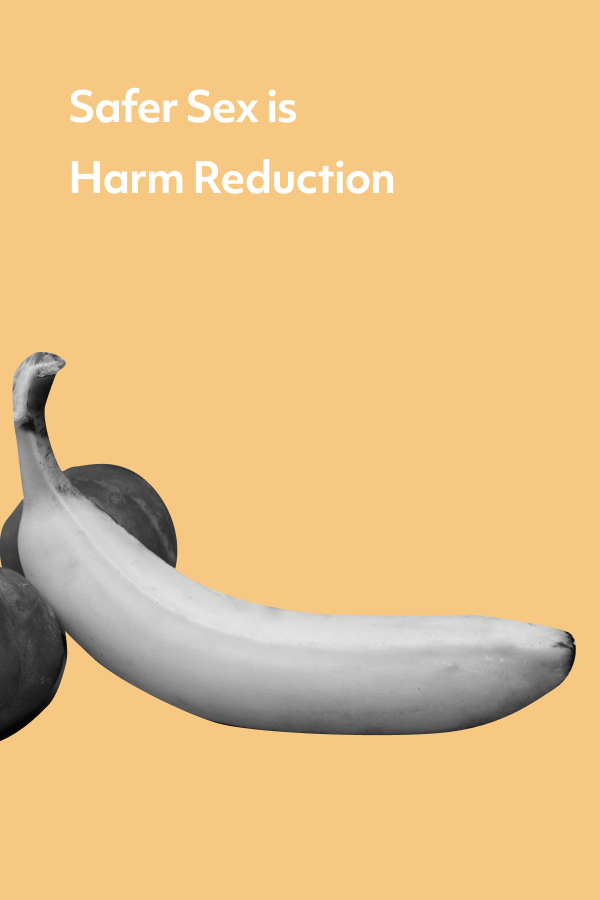What is safer sex and why are we talking about it? Safer sex is an approach to sex through a harm reduction lens. Harm reduction is a set of practical strategies and ideas to reduce your risk and avoid unwanted outcomes. With that being said, safer sex is really just an easy way of saying, “Let’s have pleasurable sex but eliminate many of the risks we might not want to take.” It’s great to keep in mind throughout this conversation that people are comfortable with varying levels of risk, and whatever level of risk you are comfortable with is okay!
Harm reduction in practice
Reducing your risk can look like many different things. It’s really dependent on each individual’s comfort level. For most people, there are many benefits to engaging in safer sex including avoiding unwanted pregnancy or sexually transmitted infections (STIs). Due to the recent Supreme Court draft that was leaked suggesting the overturning of Roe v. Wade in the near future, avoiding unwanted pregnancy may be increasingly important to folks now more than ever. So, let’s get into it!
Here are some ways you can reduce your risk:
- Use barrier methods such as internal condoms, external condoms, and dental dams. Internal and external condoms can be used for various types of penetrative sex, while dental dams can be used for various types of oral sex. It is important to remember to never use flavored condoms for penetrative sex because they can lead to infection!
- Get tested for STIs, including HIV. Knowing your status and getting tested regularly reduces your risk of spreading STIs and allows for prompt treatment if you do contract one. The CDC recommends you test with every new sexual partner.
- Communicate with your partners about what types of sex you are willing to have and what your boundaries are. This can include frequency or what type of precautions you want to take.
- Mutual masturbation is an option! If you are not quite ready to be fluid-bonded with someone, or just not ready for that next step, mutual masturbation is another way to engage in sexual activity that greatly reduces your risk of an exposure to STIs or unwanted pregnancy.
- Ask your doctor about PrEP or PEP. PrEP or pre-exposure prophylaxis is a highly effective medication that people take to prevent getting HIV if they think they might be at risk. PEP is post-exposure prophylaxis, which is a medication given after a single high-risk event with a potential exposure to HIV.
- Talk to your doctor about birth control. There are many forms of birth control nowadays, both hormonal and non-hormonal. Talk to your provider about which one would work best for you, to reduce the risk of unwanted pregnancy.
- Emergency contraception, also sometimes known by the popular brands Plan B or Ella, are an important back up plan. It can be wise to keep emergency contraception on hand in case the need arises. But be aware that these meds come with some pretty major pain points, like the fact that both medications have weight limits of 155 and 195 pounds.
- Use lube! Seriously, do it! Using lube specifically for any kind of penetrative sex act will significantly reduce the risk of tearing. Less tearing means less likelihood that bacteria can enter your body.
- Assess your risk and the type of sex you want to have. For example, oral sex is typically considered lower risk than penetrative sex, so someone might consider oral sex safer for them. Additionally, there are many ways to engage in sexual or intimate connection without engaging in either penetrative or oral sex.
If you are engaging in sex while using substances, here are a few additional things to keep in mind:
- Test your drugs! Fentanyl testing strips are simple to use and can be life-saving.
- Keep naloxone on hand. Naloxone (Narcan) is a opioid reversal medication that can stop an opioid overdose. You will still need to call 911 after administering naloxone, but you should have it available when you or others around you use drugs.
- Try to engage with people you know and trust. But if you’re participating in a hook up, tell a friend who can (and will) check on you!
- Stay hydrated! It is easy to forget to take care of yourself when engaging in sexual activity while using substances, but drinking water can make a huge difference in how you feel the next day.
- Read this blog post by Olivia Pennelle with so much more amazing information about Chemsex
Resources for Testing, Education, and Supplies
Finding resources for safer sex can be challenging! Here are some trusted sites:
STI Testing
- Find local HIV testing HERE. Many of these facilities offer STI testing as well.
- Find local STI testing HERE
Safer Sex and Other Harm Reduction Supplies
- Get supplies such as Narcan, condoms, fentanyl test strips, and other harm reduction supplies HERE from NEXTDistro
- Purchase drug testing supplies (including fentanyl test strips with no shipping cost) HERE from DanceSafe.
- To find naloxone (Narcan) in your area you can go HERE
- Your local health organization and state health departments for things like free condoms and dental dams
- Your local Planned Parenthood for free condoms, dental dams, and birth control options.
Education
- Safer Sex (“Safe Sex”) | Reduce Your Risk of Getting STDs
- Sexuality | Scarleteen
- SHIP
- Trans Sex Education – GenderGP Transgender Services
- Safer Sex Archives – SextEd
- Prevention services
- Find an HIV Test | Testing | HIV Basics | HIV/AIDS | CDC










